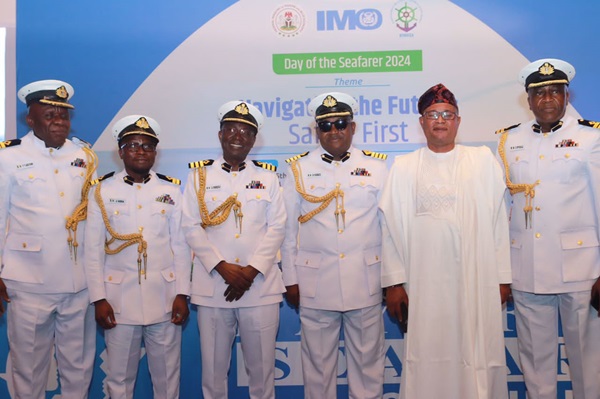
The Minister of Marine and Blue Economy, Adegboyega Oyetola, CON, has hailed seafarers as the lifeblood of the maritime industry, essential to the success of the Blue Economy.
Oyetola made the emphasis during his keynote address at the commemoration of the 2024 Day of the Seafarer in Lagos, where he reiterated the Federal Government’s commitment to developing the Nigerian maritime sector. He noted that this year’s theme, “Navigating the Future, Safety First,” aligns with the vision of the Ministry of Marine and Blue Economy.
“Seafarers are the lifeblood of the maritime industry. They endure the isolation of the open sea, the unpredictability of weather, and the myriad challenges of navigating some of the world’s busiest and most perilous waters. Their resilience, dedication, and unwavering commitment ensure that goods and resources reach every corner of our planet, supporting livelihoods and promoting international trade,” he said.
Represented by the director of maritime safety and security in the Ministry of Marine and Blue Economy, Mr. Babatunde Bombata, Oyetola assured that the Federal Government remains committed to collaborating with industry stakeholders and advocating for the rights and welfare of Nigerian seafarers. “We are committed to providing comprehensive training programs, enforcing stringent safety regulations, and offering continuous support to ensure our seafarers are among the best trained and most resilient in the world. We are dedicated to building on this foundation, ensuring that Nigerian seafarers are equipped to meet the challenges and opportunities of the modern maritime landscape,” he said.
Furthermore, he pledged the Ministry’s resolve to prioritise the growth and development of the Marine and Blue Economy sector, noting that its development will greatly benefit all Nigerians and future generations. “We are working closely with stakeholders in the private sector, international organisations and other government agencies to create an enabling environment for the growth of the Maritime and Blue Economy,” he stated.
Oyetola also called for stakeholders’ support in developing the sector, noting that the Ministry cannot undertake the task alone. “This celebration of World Seafarers Day presents a unique opportunity to explore emerging issues and propose innovative solutions to the challenges facing the sector. We must remain resolute and deliberate in promoting the growth and development of the Marine and Blue Economy sector, as the ministry cannot achieve this alone,” he said.
The chairman of the Senate Committee on Maritime Safety, Education and Administration, Sen. Wasiu Eshinlokun alongside his counterpart in the House of Representatives, applauded the seafarers for their resilience and assured them of the government’s continuous support to guarantee their well-being. He said the National Assembly would work with NIMASA and other stakeholders to support any legislation to advance the rights and safety of all seafarers. “Together, let us continue to strive for a maritime world that is equitable and inclusive for all.”
The director-general of the Nigerian Maritime Administration and Safety Agency (NIMASA), Dr. Dayo Mobereola acknowledged the uniqueness of the profession and the challenges faced by seafarers. He noted that the theme for this year’s celebration, “Navigating the Future: Safety First,” calls for addressing the challenging conditions seafarers face while navigating the sea. He emphasised the need for greater focus on their well-being and safety at sea.
“We recognise the humongous challenges seafarers face while sailing; ranging from piracy, kidnapping, encounters in war zones, exposure to health risks, and unfair treatment. Despite these challenges, Nigeria has recorded zero piracy incidents in the last two years; we will not rest on our oars as the life of every seafarer matters,” Mobereola stated.
He assured that the agency will continue to collaborate with both local and international organisations to address global issues affecting seafarers and ensure their safety while navigating the future. “Nigeria has the young population to compete with other countries whose seafarers contribute immensely to their Gross Domestic Product (GDP). Hence, the agency will continue to invest in training and capacity-building programmes to enhance seafarers’ skills, welfare and employment opportunities,” he added.
Mobereola also informed stakeholders that the agency is working tirelessly to strengthen its legal frameworks by domesticating all maritime labour-related ILO Conventions ratified by Nigeria. “These conventions include the Maritime Labour Convention (MLC) 2006 as amended, the Seafarers Identity Document (SID) Convention as amended and the Dock Work Convention,” he said.
“We will continue to focus on implementing programs and projects to improve seafarers’ welfare, including mental health support, safety training and emergency assistance. We will also continue to eliminate substandard vessels from our waters and ensure wrecks are removed to aid navigation and safety for our seafarers,” he assured.
He also mentioned that many beneficiaries of the Nigerian Seafarers Development Programme (NSDP) are currently undergoing mandatory sea-time training aboard ocean-going vessels. The agency is collaborating with key stakeholders like NLNG Shipping and Marine Services Limited, the Nigerian Content Development and Monitoring Board (NCDMB), indigenous shipping companies and the Nigeria Immigration Service (NIS), all geared towards boosting the capacity of seafarers.
Katie Higginbottom from the International Transport Federation (ITF), who joined virtually, emphasised that seafarers are a critical part of the maritime sector. She also commended NIMASA’s renewed collaboration with the ITF to ensure seafarers receive the necessary attention from their respective governments. President of the World Maritime University, Professor Max Mejia who also joined virtually, expressed gratitude to the seafarers and described them as modern-day heroes who deserve celebration.
In their goodwill messages, stakeholders praised the invaluable contributions of seafarers to the global economy and urged governments to continue supporting them through favourable policies that will enhance their well-being in line with the Maritime Labour Convention (MLC) 2006.
The International Day of the Seafarer is celebrated annually on June 25 to recognise the contributions of seafarers to international seaborne trade and the world economy as a whole. The day is organised by the International Maritime Organisation and recognised by the United Nations as an observance day.

